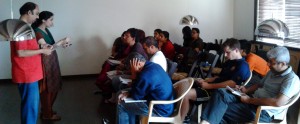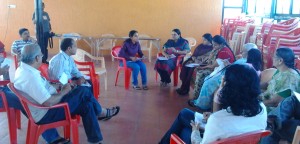
RSS IT Milan's Kannada Parichaya Varg
It was at this juncture that the software engineers of Bangalore IT Milans noticed this and decided to take things into their hands. The initiative that they took resulted in the ‘Kannada Parichay Varg’ which fructified on Feb 11th and 12th, 2012. The event that took place from 2PM to 6PM on both these days, witnessed more than 3000 non-Kannadigas being introduced to Kannada. Close to 330 enthusiastic software professionals, not only Swayamsevaks of IT Milans, were involved in teaching Kannada on these two days.

Bangalore: ‘Nanna hesaru Arpita. Nimma hesaru enu?’ (My name is Arpita. What’s your name?) asked one in the room. ‘Nanna hesaru Nikhil Lad’ answers the other. Just then comes the next question ‘Nanna mane Jayanagaradallide. Nimma mane ellide?’ (My house is in Jayanagar. Where is your house?) and that too was immediately answered. Now, you must be wondering what is so special in this! It’s special indeed, because the persons who asked the questions were the Kannada tutors and those who answered were the non-Kannada pupils who came to learn Kannada. This was the scene at more than 200 apartments in Bangalore last Saturday and Sunday. It was the ‘Kannada Parichay Varg’ (Introductory Kannada classes) in progress at these apartments.
Bangalore, like other major cities of India, attracts lakhs of people from different parts of the country, every year. The influx in the last few years has been so huge that people from different states now constitute a significant percentage of the population in Bangalore. Hence we get to hear statements like ‘Bangalore has grown haphazardly. People who have settled here from all over India are in a Majority and hence at several places in Bangalore we don’t get to hear Kannada at all. One doubts if this is in Karnataka or not. It’s difficult for Kannada to survive in Bangalore’. It is also true that there is dissatisfaction among the people who are concerned about Kannada that people who come from outside do not learn Kannada and hence the number for Kannada speakers is dwindling by the day. However, it should also be noted that if Kannadigas themselves speak with non-Kannadigas in Hindi or English, how or why will they learn Kannada? If that’s the scenario, then who will teach Kannada to them? What facilities are available for this? Metaphorically, who will bell the cat?

It was at this juncture that the software engineers of Bangalore IT Milans noticed this and decided to take things into their hands. The initiative that they took resulted in the ‘Kannada Parichay Varg’ which fructified on Feb 11th and 12th, 2012. The event that took place from 2PM to 6PM on both these days, witnessed more than 3000 non-Kannadigas being introduced to Kannada. Close to 330 enthusiastic software professionals, not only Swayamsevaks of IT Milans, were involved in teaching Kannada on these two days. The speciality of the event also lies in the fact that there were several married couples who donned the role of Kannada teachers at many apartments and so did many women software professionals at several others. People who had no clue or idea about Kannada, long-time residents in Bangalore who wanted to learn Kannada but did not find an avenue to learn, started to speak basic Kannada in just two days and ‘My name is so-and-so, what is your name?’ became a kind of a catchphrase. And all of this was for free!
A proverb says ‘an idea moves the world’. Pravatchandra Patra of RSS IT Milan (IT Milan is a weekly RSS meeting/shakha of IT professionals on Sundays), who works in Glomantra Inc and is originally from Orissa, says it all started with an idea of teaching Kannada during a conversation with friends and that all of them agreed without much deliberation. Without much delay, whole of IT Milan team involved themselves in the preparations for the event. One team was involved in identifying apartments which would become the training centres; another team was involved in identifying Kannada teachers among their friends, relatives and colleagues and imparting training to the volunteers through demonstrations. Yet another team was entrusted with the job of co-ordinating the volunteering teachers to the apartments where they would teach Kannada and arrange for their commutation. Likewise, there were around 600 IT Milan Swayamsevaks who were involved in this endeavour for about 3 months. It was due to this elaborate planning that the event could happen simultaneously at so many places says Pravatchandra Patra. Adding to that Raghavendra Kulkarni, who works for Accord Software, said that one more team worked which designed the syllabus, reformed and fine-tuned it for about a month. ‘Learning material has been created keeping people of all ages in mind and to make learning fun’, he adds.
We were convinced that the impression that non-Kannadigas are not interested to learn Kannada was a myth. ‘While about 5 centres had more than 40 pupils, most of the centres receiving requests from the participants to continue it during the coming weekends is a proof of this’, says Supradeep Subrahmanya, who is a software engineer and volunteered to teach Kannada. Also to be noted is the fact that hundreds of non-Kannada volunteers, including several IT Milan Swayamsevaks, belonging to states like Orissa, Andhra Pradesh, Tamil Nadu, Punjab, Maharashtra and others, complemented the efforts by helping organize the sessions in their apartments and approaching people to participate in the training through door to door campaigns.
Finally it would not be wrong to assert that this unique exercise mirrors the concern that the software professionals have for Kannada and also their organizational skills.





